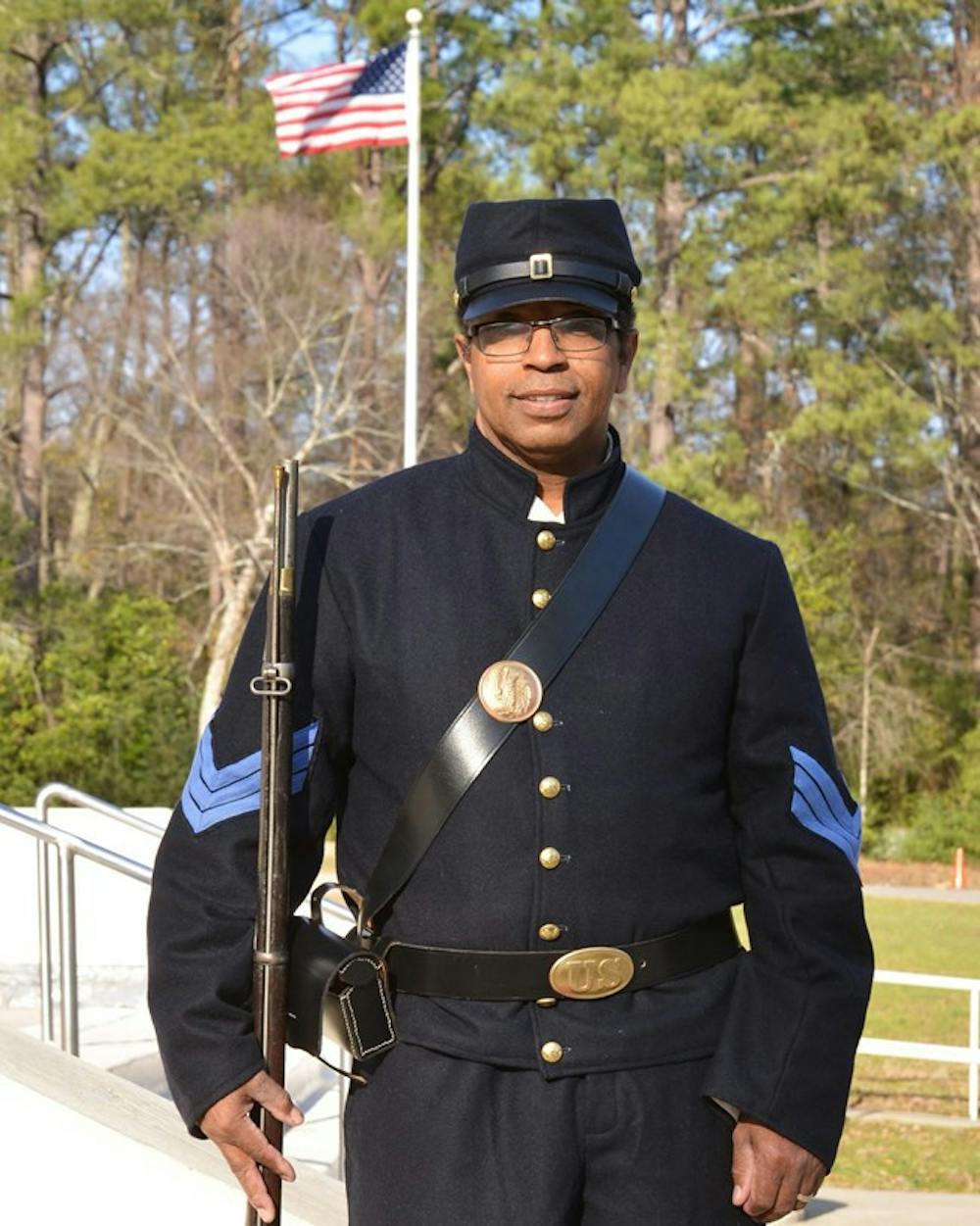The Civil War era “Battle Hymn of the Republic” plays patriotically in the background as guests of Ocmulgee National Monument take their seats for the third annual Ranger Talk celebrating Black History Month.
As visitors find an open chair in the downstairs classroom, Park Ranger Lonnie Davis answers questions in a full Union Army uniform.
“I have my trusty musket,” said Lonnie Davis, the park`s cultural resources specialist and historian. “I cover parts of history that has slipped historians and history books.”
The month-long program focuses on Georgia’s African Brigade formed as part of the United States Colored Troops in the later part of the American Civil War.
The Black History Month event began last Saturday and will continue on Feb. 10, 17 and 24.
Each presentation is scheduled from 2 p.m. to 3:30 p.m. and is free and open to the public. All presentations take place in the park’s museum.
“This happened right here in Macon, Georgia,” Lonnie Davis said.
The last three colored regiments under the Bureau of Colored Troops were formed in Macon.
The African Brigade would span the years of 1863 to 1867.
In the lesser known Civil War event titled “Wilson's Raid,” Union General James Harrison Wilson led a march from Alabama to Georgia.
During this operation, Wilson's men liberated 3,211 former slaves, who would become part of the Georgia African Brigade.
Almost overnight these once chattel servants transformed from slave to soldier.
It would be the 136th, 137th and the 138th Infantry Regiments of the brigade that were positioned in Georgia to assist with the fulfilment of the Freedmen’s Bureau.
The Freedmen's Bureau was founded in 1865 with the ending of the Civil War to assist destitute and suffering refugees and newly freedmen and their wives and children in the South.
David A. Davis, associate director of the Center for Southern Studies at Mercer University, said that often the Civil War is reduced to only the battles and generals involved.
“But the Civil War was actually a social revolution that affected the everyday life of virtually every American alive at the time,” David Davis said. “Understanding the war requires understanding much more than just the military history.”
The Ranger Talk is designed to educate audiences on forgotten African American history in one of the most pivotal wars in our nation’s past.
Former slaves were freed and recruited, ironically given muskets confiscated from the Confederate Army and formed some of the most significant brigades to serve during the Reconstruction Era of the South.
Yet, most Americans do not know this story.
“Most people don’t know history, they know heritage,” Lonnie Davis said.
He said that most people know the general heritage of their particular ethnic group passed down from each generation through time.
However, they do not know the more detailed history of events.
“We should bear in mind that African Americans were actively involved in the Civil War in many ways. They contributed to resistance programs, spy networks and fought their own freedom,” David Davis said.
The Mercer professor said the South is not monolithic or static, but instead complicated and dynamic.
Lonnie Davis has crafted a 16-page historical document and a 110-page genealogical data log with all recorded individuals from the Georgia brigade.
According to the park historian, his genealogical document is possibly the first complete record of these previously enslaved people.
The document features the soldiers’ names, unit they were assigned to, their rank, where they were born, their age of enlistment and their date of death if available.
“It just so happens that Cesar Davis was my great great grandfather,” said Lonnie Davis.
On page 49 from the 137th Infantry, Sergeant Cesar Davis of Upson County, Georgia is listed, Lonnie Davis’ paternal grandfather.
Lonnie Davis said this document can be used for genealogical research. He is living testament to that.
At the end of the day, the park ranger said he wants to show that not all people of color in the United States were slaves. Some of these people were craftsmen, others engineers or even at one time soldiers.
Slave to Soldier: How 3,211 Black men were freed

Park Ranger Lonnie Davis in Union uniform will lead a series of four Saturday presentations at Ocmulgee National Monument discussing the Georgia African Brigade during the Civil War.




